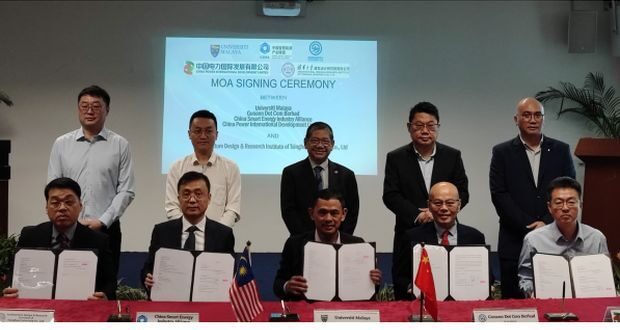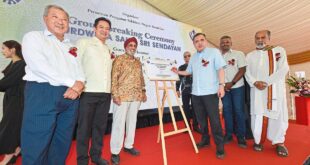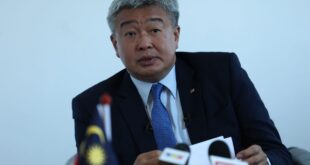The respective teams for the MOA signing ceremony at UM.
KUALA LUMPUR: Malaysia and China have taken a significant stride towards carbon neutrality with the signing of Memorandums of Agreement (MOA) and Memorandums of Understanding (MOU).
The event took place at Universiti Malaya (UM) involving various prestigious institutions such as UM, Tsinghua University’s Architectural Design and Research Institute, China Smart Energy Industry Alliance, China Power International Development Ltd., and Guoann Dot Com Bhd.
These agreements mark a historic collaboration between Malaysia and China in the realms of clean energy and carbon neutrality, celebrating the dual mission of the 50th anniversary of diplomatic relations between the two nations and the shared development of the Belt and Road Initiative.
Tsinghua University’s Architectural Design and Research Institute, a leader in China’s urban planning and architectural design sector, will join forces with UM to foster research and development in carbon neutrality and renewable energy, injecting fresh, green momentum into the Belt and Road Initiative.
UM has made indelible contributions to national development, including nurturing five Malaysian Prime Ministers. Its active participation in the Belt and Road Initiative has significantly contributed to regional collaboration for Malaysia.
Tsinghua University’s institute, known for its unique integration of education, research, and production and its extensive international cooperation and project implementation experience, provides invaluable intellectual support for sustainable, high-quality development.
The MOA aims to establish a joint research and development center for carbon neutrality, deepening technical and knowledge exchange in clean energy between the two countries, and injecting green intelligence into the Belt and Road projects.
The agreement was signed by key representatives, including Guoann Dot Com Bhd chief executive officer Teo Kok Ann, Universiti Malaya vice-chancellor’s representative Prof Dr Kaharudin Dimyati, Tsinghua University’s institute’s School of Architecture deputy dean Prof Borong Lin, China Smart Energy Industry Alliance vice chairman Shi Chun, and China Power International Development Limited deputy general manager Lu Xiang.
The MOA strengthens the technological and knowledge exchange in clean energy development between Malaysia and China, aiming to enhance Malaysia’s application of clean and renewable energy, demonstrating its commitment to achieving carbon neutrality.
This lays the foundation for Malaysia’s upcoming development phase, with plans to build power stations exceeding 2-3 GW of clean and smart energy, propelling the nation towards a low-carbon, sustainable future.
The development of this high-capacity clean and renewable energy power station will be a joint effort by Guoann Dot Com Bhd and the China Smart Energy Industry Alliance, with the MOU signed on the same day to confirm this collaboration.
The MOU is expected to deepen bilateral relations between Malaysia and China, creating a more positive environment for sustainable development cooperation.
Guoann Dot Com Bhd, an online business platform in Malaysia, plays a crucial role in integrating and connecting resources among members of the Regional Comprehensive Economic Partnership (RCEP), coordinating and advancing various projects.
Under the high-level guidance of the Chinese government, the China Smart Energy Industry Alliance focuses on technological innovation and the development of clean, efficient energy systems, providing systemic resources for industry chain collaborative innovation and application promotion.
China Power International Development Ltd, with its rich experience in technological innovation and clean energy, as well as its listing on the Hong Kong Stock Exchange, brings significant momentum to this collaboration.
At the event, Shi stated: “The renewable energy power station project and zero-carbon park construction are expected to draw an investment of nearly 20 billion RMB (about RM14bil).”
This cooperation signifies a new chapter in clean energy for Malaysia and China, contributing practical actions to the Belt and Road Initiative and the 50th anniversary of diplomatic relations, positively impacting Environmental, Social, and Governance (ESG) goals, and reinforcing both nations’ commitment to environmental protection. This marks a new milestone in Malaysia-China friendship, injecting a higher level and deeper vision for future collaboration.
When asked about how feasible the standard for carbon neutral here in Malaysia, Higher Institution Centre of Excellence (HICoE) UM Power Energy Dedicated Advanced Centre (UMPEDAC) executive director and UM representative Prof Dr Nasrudin Abd Rahim shared that “The feasibility will depend on the R&D process and the research done, but we aim to turn UM into a smart campus, which will focus on research and solving the carbon problem.”
Teo stated that “Currently there are multiple parties from different states in Malaysia that are showing interest for the project, we plan to finalise the location in the upcoming months.”
 BeritaKini.biz Berita Viral Terkini di Malaysia
BeritaKini.biz Berita Viral Terkini di Malaysia





